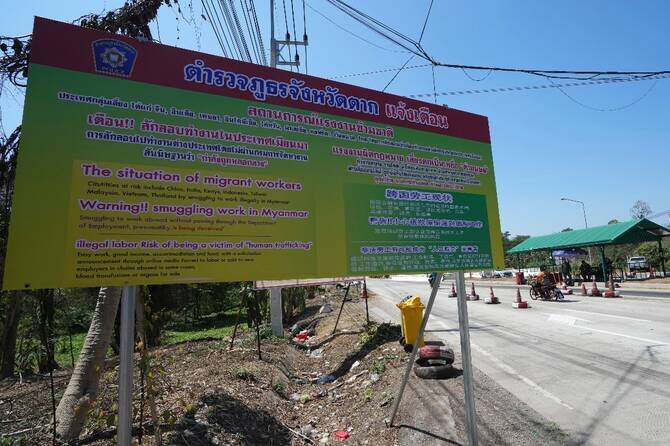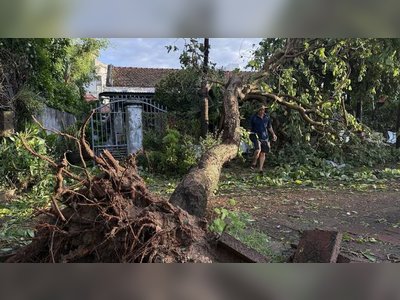
Scam Centers Flourish in Southeast Asia Despite Crackdowns
Despite efforts to root out the industry, scam centers are proliferating across southeast Asia, ensnaring thousands of workers and defrauding millions worldwide.
BANGKOK: The deceptive tactics used by these illicit operations often begin innocuously enough.
A text message may be sent asking if one is available for weekend work or a simple 'hello' from an unknown number.
This typically leads to a laborer, working grueling 12-16 hour shifts, inundating potential victims with messages in hopes of securing a mark.
The ultimate goal remains the same: to swindle money out of unsuspecting individuals.
According to reports, victims have lost tens of billions of dollars, and hundreds of thousands are ensnared in forced labor to sustain these fraudulent operations.
These workers often reside in vast complexes spread across southeast Asia.
The complexity involved in eradicating this scam industry can be attributed partly to several factors, including:
Crackdowns in Myanmar: The Myanmar military has targeted one of the most notorious compounds, KK Park, along its border with Thailand.
Despite claims of complete shutdowns by authorities, parts of these complexes continue to operate covertly.
Emergence from Casinos: Scam centers are frequently located in rural areas and comprise sprawling complexes that house sleeping quarters, shops, and recreational facilities for staff members.
These establishments often begin as single properties before being subdivided and leased out to various scam operators.
Protection by Local Elites: Smaller operations may be found within legitimate office buildings or rented dwellings, operating under the protection of local influential figures.
The industry's origins can be traced back to casinos, both online and physical, which proliferated across southeast Asia.
In 2021 alone, there were over 340 licensed and unlicensed casinos, according to UNODC (United Nations Office on Drugs and Crime).
Relying on Trafficked and Willing Labor: It is estimated that between 120,000 and 200,000 individuals in Myanmar are subjected to forced labor for scam operations.
In Cambodia, the figure is approximately 100,000, as per a UNOHCHR (United Nations High Commissioner for Human Rights) report from 2023.
Global Reach: The scam industry now engages workers from more than 56 countries, including Indonesia and Liberia, according to UNODC.
Victims' passports are typically confiscated, limiting their ability to escape the compounds where only senior managers possess freedom of movement.
The Problem's Global Scale: Scammers utilize AI-powered translation tools to target individuals worldwide without prejudice.
Various scams have been uncovered, such as investment schemes in cryptocurrency and online task scams where victims are requested to make payments for further instructions.
Despite efforts by governments and the rescue of workers from scam compounds, activists stress that the primary offenders remain at large.
New reports of scam operations continue to surface both regionally and internationally.
A text message may be sent asking if one is available for weekend work or a simple 'hello' from an unknown number.
This typically leads to a laborer, working grueling 12-16 hour shifts, inundating potential victims with messages in hopes of securing a mark.
The ultimate goal remains the same: to swindle money out of unsuspecting individuals.
According to reports, victims have lost tens of billions of dollars, and hundreds of thousands are ensnared in forced labor to sustain these fraudulent operations.
These workers often reside in vast complexes spread across southeast Asia.
The complexity involved in eradicating this scam industry can be attributed partly to several factors, including:
Crackdowns in Myanmar: The Myanmar military has targeted one of the most notorious compounds, KK Park, along its border with Thailand.
Despite claims of complete shutdowns by authorities, parts of these complexes continue to operate covertly.
Emergence from Casinos: Scam centers are frequently located in rural areas and comprise sprawling complexes that house sleeping quarters, shops, and recreational facilities for staff members.
These establishments often begin as single properties before being subdivided and leased out to various scam operators.
Protection by Local Elites: Smaller operations may be found within legitimate office buildings or rented dwellings, operating under the protection of local influential figures.
The industry's origins can be traced back to casinos, both online and physical, which proliferated across southeast Asia.
In 2021 alone, there were over 340 licensed and unlicensed casinos, according to UNODC (United Nations Office on Drugs and Crime).
Relying on Trafficked and Willing Labor: It is estimated that between 120,000 and 200,000 individuals in Myanmar are subjected to forced labor for scam operations.
In Cambodia, the figure is approximately 100,000, as per a UNOHCHR (United Nations High Commissioner for Human Rights) report from 2023.
Global Reach: The scam industry now engages workers from more than 56 countries, including Indonesia and Liberia, according to UNODC.
Victims' passports are typically confiscated, limiting their ability to escape the compounds where only senior managers possess freedom of movement.
The Problem's Global Scale: Scammers utilize AI-powered translation tools to target individuals worldwide without prejudice.
Various scams have been uncovered, such as investment schemes in cryptocurrency and online task scams where victims are requested to make payments for further instructions.
Despite efforts by governments and the rescue of workers from scam compounds, activists stress that the primary offenders remain at large.
New reports of scam operations continue to surface both regionally and internationally.










